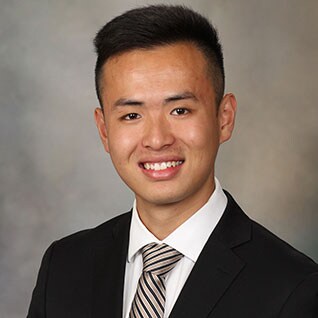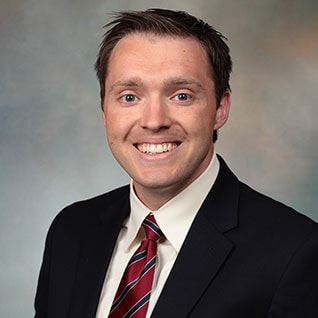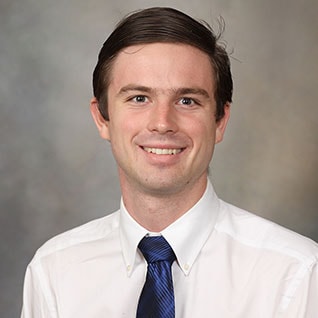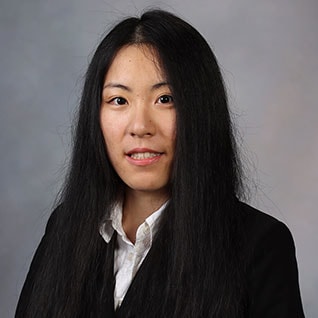/prod01/channel_2/media/mccms/content-assets/about/news/jan-april-2021/size-1024X512_2021-Education-and-Tech-Forum.jpg)
March 30, 2021
The 9th annual Education and Technology Forum (ETF), held virtually in February, was not just an event for Mayo Clinic educators and staff. It also invited learners into the conversation, so their voices, their ideas, and their designs for learning spaces of the future were heard.
To design the future of education at Mayo Clinic College of Medicine and Science, all voices, especially those of current learners, are valued. Four of those learners share their perspectives of the event and their takeaways for the experience.

Harvey Huang
Huang is in his third year of the M.D.-Ph.D. program in the Clinical and Translational Science (CTS) track. He decided to attend the Education and Technology Forum for two reasons.
“First, as both a medical and Ph.D. student, I am invested in improving the campus space available for student and faculty integration,” shares Huang. “At the most recent CTS track retreat, the topic of improving graduate student study space on campus was thoroughly discussed. ETF felt like a natural segue to think more about this issue. Second, I am interested in entrepreneurship as an integral component of my future career, and ETF helped to provide some relevant tools toward this goal.”
“One important takeaway from the Forum was to consider all stakeholders when innovating. As a student here for at least the next five years, I recognize the importance of my own voice as a stakeholder, and therefore I will continue to be involved in the future of education here at Mayo.”

Marcus Callister, M.D.
Third year neurology resident at Mayo Clinic's campus in Phoenix/Scottsdale, Arizona, Dr. Callister shares that, "part of what brought me here is Mayo’s extensive involvement and influence in medical education. I love learning theory and evidence-based education, it’s part of why I chose neurology."
Dr. Callister is en route to be education chief resident for the Adult Neurology Residency. With that upcoming role in mind, he was “actively experimenting with using Anki computerized flashcards, OneNote, Google Drive, and Twitter for education.” He attended the Forum because he was curious to see what other people involved in education at Mayo Clinic were doing.
"The group brainstorming was good practice and I learned a lot," says Dr. Callister. He looks forward to participating in future education-centered events and hopes that some of the ideas generated at the event will turn into actionable projects.

Jay Jenkins
Jenkins is a student in the Immunology track of the Ph.D. program. As a student on the Florida campus, when most of his track is located in Rochester and Arizona, he was very familiar with virtual learning.
“I found the Forum to be very insightful," says Jenkins. "I liked how we could share our ideas as to how to increase learning spaces of the future, and I also enjoyed learning about how new ideas can get developed and tested before being scaled up. I also found it very heartening that Mayo Clinic is trying to take ideas from its stakeholders—including students like me—when designing its learning spaces of the future.”

Sherry Zhou
Zhou is a first year MD-PhD student at Mayo Clinic in Rochester, Minnesota. Choosing Mayo Clinic for her education, Zhou shares that she "truly resonated with Mayo's motto that the 'needs of the patient come first' and am incredibly honored to be able to train among outstanding peers and learn from renowned educators, physicians, researchers, and physician-scientists."
"The Education and Technology Forum caught my attention because the role of technology in education and teaching has become increasingly nuanced and complex," says Zhou. "With my current experiences undergoing virtual learning, I wanted to hear from educators and peers about their current struggles, what they sought to change, and ideas they have to improve the integration of technology and its use to augment and facilitate education."
"I would definitely want to continue to be involved in the future of education here at Mayo Clinic," says Zhou. "Student input is so important to shaping education tools, environment, and innovation, and I hope that some of the ideas I shared during the ETF can inspire and influence the ongoing conversations about the future of technology in education."
ETF and beyond
The ETF planning team is currently conducting a thematic analysis of the more than 4,000 ideas generated during the three hour event. Their recommendations will be shared with education leadership and help guide strategic initiatives and development of learning spaces for the future. You can follow this progress and contribute to the discussion on Twitter using the hashtag #MayoClinicETF.
Save the Date for the 2022 Education and Technology Forum—Wednesday, Feb. 9, 2022.